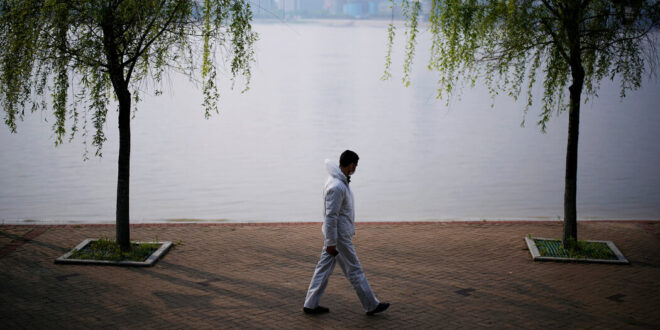China’s struggle in opposition to the coronavirus was principally over, however Zhang Xiaochun, a physician in Wuhan, was sinking into melancholy, satisfied she had failed as a daughter and mom. She agonized over her choice to maintain working even after her father fell critically in poor health. She anxious about her younger daughter, whom she had often left alone at residence.
However quite than disguise these emotions, as would have been widespread just some years in the past in a rustic the place psychological sickness has lengthy been stigmatized, Dr. Zhang consulted therapists. When associates and colleagues checked in on her, she brazenly acknowledged that she was struggling.
“If we will face such an enormous catastrophe as this outbreak, then how may we not dare to speak about one thing so small as some psychological well being issues?” stated Dr. Zhang, an imaging specialist.
The coronavirus pandemic, which began in China, has pressured the nation to confront the difficulty of psychological well being, a subject lengthy ignored due to scarce sources and widespread social stigmas. Within the Mao period, psychological sickness was declared a bourgeois delusion and the nation’s psychiatric system was dismantled. Even as we speak, discrimination persists, and many individuals with psychological diseases are shunned, hidden at residence or confined in establishments.
However after the coronavirus outbreak, that form of neglect has turn into more and more untenable. The uncertainty of the pandemic’s early days has mixed with the grief and terror of the next weeks to go away a trauma each private and collective.
On the peak of China’s outbreak, greater than a 3rd of individuals across the nation skilled signs of melancholy, anxiousness, insomnia or acute stress, in response to a nationwide survey by a Shanghai college. An professional in Beijing not too long ago warned that the consequences may linger for 10 to 20 years.
Due to the Chinese language authorities’s top-down management, officers have mobilized rapidly to supply assist. Native governments have arrange hotlines. Psychological associations have rolled out apps and held on-line seminars. Colleges are screening college students for insomnia and melancholy, and universities are establishing new counseling facilities.
However the nation additionally faces severe challenges. There’s a dearth of therapists for the nation’s 1.four billion folks, with fewer than 9 psychological well being professionals for each 100,000 residents as of 2017, according to the World Health Organization.
China’s centralized political system, for all its strengths in mobilizing sources, can also create issues of its personal. The federal government has curbed public mourning and suppressed calls for accountability over early missteps, pushing a simplified narrative of China’s triumph over the virus.
Nonetheless, the hope is that the pandemic may propel a long-term shift within the dialog round psychological well being in China, with advocates pointing partially to high-level authorities orders to enhance remedy.
“Due to the pandemic, they’re braver in coming to ask for assist,” Du Mingjun, a psychologist in Wuhan, stated of the inflow of individuals she had seen looking for remedy this yr. “An increasing number of persons are accepting this. That’s new.”
Ms. Du was one of many first witnesses to the disaster’s psychological well being toll. On Jan. 23, the day Wuhan locked down, she and her colleagues on the provincial psychologists’ affiliation helped launch a government-backed 24-hour hotline, inserting adverts in newspapers and posting on WeChat to achieve a metropolis out of the blue convulsed by worry.
Instantly, they had been inundated. A lady known as as a result of her dad and mom had been in separate hospitals, and making an attempt to run between the 2 had left her on the breaking point. A person was taking his temperature each 30 minutes, petrified of falling in poor health. A 12-year-old boy dialed on behalf of his mom, explaining that he was anxious about her. On the peak, the hotline managed between 200 and 300 calls every day, Ms. Du stated.
Because the state of affairs improved, the calls tapered off. By late October, there have been round 10 a day. Some callers had been nonetheless looking for assist for trauma associated to the outbreak, introduced again by information experiences, or outdated photographs glimpsed on cellphones. However others have come in search of assist with extra mundane points, akin to tutorial strain or arguments with household.
“I believe this alteration is right here now, and there’s no strategy to cease it,” Ms. Du stated. “All of us lived by way of this collectively, and it was repeatedly unfolding round us. So the collective consciousness of our group could be very deep.”
Across the nation, colleges have expanded psychological well being counseling and inspired college students to take time to unwind, because the Ministry of Schooling has warned of “post-epidemic syndrome.” Officers have stated that after months of disturbing lockdowns, college students could be extra prone to have conflicts with dad and mom and lecturers.
Even earlier than the pandemic, the tendencies in college students’ psychological well being had been worrying. A Shanghai official said in May that suicides amongst Okay-12 college students had been on the rise, with stress arising from tutorial strain and home disputes.
Whereas the rollout of providers has been spotty, educators and college students say the marketing campaign has helped break stereotypes about psychological well being. Within the northern province of Hebei, officers have produced cartoons to assist college students perceive trauma. Within the southern metropolis of Guangzhou, college students are writing letters about anxiousness and training respiration workouts.
Xiao Zelin, a junior at Solar Yat-sen College in Guangzhou, stated he suffered anxiousness and insomnia when he returned to campus this fall. After months of being cooped up at residence, he struggled adjusting to crowds of individuals. His urge for food was poor and he couldn’t appear to calm down.
Mr. Xiao had by no means visited a therapist earlier than, however he spoke with a counselor offered by his college. The counselor, he stated, helped him perceive what he was going by way of and to be affected person with himself. Mr. Xiao recommended his classmates enroll as nicely.
“To start with I used to be misplaced,” he stated. “Now I’m feeling a lot better.”
Liang Lingyan, a psychologist in Shanghai, stated the federal government there had additionally organized extra group providers, akin to residence visits for seniors who stay alone.
“After the epidemic, persons are paying way more consideration to well being, particularly psychological well being,” she stated. “This can be a long-term change.”
Regardless of the efforts, cracks within the system stay.
There are indicators that those that need assistance have issue discovering it. One survey by Chinese language researchers discovered that solely 7 % of sufferers with psychological problems had sought on-line assist through the pandemic, regardless of the introduction of apps and web sites by the federal government.
There are additionally too few high-quality coaching packages for psychological well being professionals, stated Yu Lingna, a psychologist from China who’s now primarily based in Tokyo. Even when these had been expanded, coaching folks would take time.
“I count on we can be in a state of inadequacy for our lifetimes,” she stated.
For Dr. Zhang, the imaging specialist who labored in Wuhan, the sensation that she had betrayed her household lingered, at the same time as state media feted frontline medical doctors for his or her contributions. Her father recovered however her dad and mom handled her coldly.
Research recommend that medical employees could also be particularly vulnerable to the pandemic’s aftershocks, with one research discovering that over half of Chinese language well being care employees surveyed confirmed signs of melancholy. Whereas a lot of these signs light because the epidemic ebbed, others, akin to a way of guilt over shedding sufferers, may persist, experts said.
Dr. Zhang stated she discovered remedy unhelpful, however she ultimately discovered different sources of consolation. She immersed herself within the writings of Wang Yangming, a Ming dynasty thinker. “It’s straightforward to catch the thief that lives within the mountain, however exhausting to catch the thief that lives within the coronary heart,” he wrote.
She additionally ultimately left her job on the Wuhan hospital and is now residing in Chengdu, within the nation’s southwest, spending time along with her husband and daughter. She is hopeful that in the future her dad and mom will perceive her selections.
Dr. Zhang has often emphasized that her expertise shouldn’t be distinctive. Lots of her former colleagues are additionally nonetheless grappling with the scars of the outbreak, she stated, and he or she was heartened that a lot of them had additionally turned to associates or therapists.
“Any large disaster like that is sure to go away folks with some kind of ache,” she stated. “There’s nothing shameful about it.”
Albee Zhang and Liu Yi contributed analysis.
The Substance Abuse and Psychological Well being Providers Administration Nationwide Helpline gives free and confidential info on psychological well being remedy and providers, 24 hours a day. Name (800) 662-4357 or TTY: (800) 487-4889.
 Top Naija News – Nigeria News, Nigerian News & Top Stories Top Naija News – Nigerian Newspapers, Nigerian News. topnaijanews is a daily Nigerian newspaper covering Latest News, Breaking News, Entertainment, Sports, Lifestyle and Politics.
Top Naija News – Nigeria News, Nigerian News & Top Stories Top Naija News – Nigerian Newspapers, Nigerian News. topnaijanews is a daily Nigerian newspaper covering Latest News, Breaking News, Entertainment, Sports, Lifestyle and Politics.




